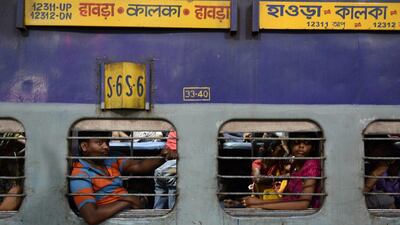ON BOARD THE KALKA MAIL TRAIN, India // While the famed Kalka Mail service made its way from New Delhi to Kolkata, those on board described how they wanted the next government to get the country back on track.
As India awaits for the results of its mammoth election due on Friday, the passengers on the service between the modern-day capital to its colonial-era predecessor voiced their frustration at the current state of the nation and their opinion of Narendra Modi, who is forecast to become their new prime minister.
As a youngster, Mr Modi helped his father man a tea stall — part of a backstory that contrasts sharply with his main rival Rahul Gandhi's gilded childhood.
So as he pours mugs of piping hot tea for his customers on a station platform, Devdutt Sharma is understandably delighted at the prospect of a man such as Modi becoming India’s leader.
“If a tea boy can become a prime minister, it’s great,” said the 55-year-old Mr Sharma who spends 18 hours a day selling tea, bottled water and snacks at Hathras station in Uttar Pradesh, India’s most populous state.
Mr Sharma, who earns around 7,000 rupees (Dh440) a month, said he had high hopes that a Modi government would generate new jobs that would give his five children a steady income. His two daughters are jobless and his sons help out in a small store.
But for all his enthusiasm for Mr Modi, who leads the right-wing Bharatiya Janata Party, Mr Sharma said he had to deliver results in his first term.
“If he doesn’t do well, after five years the people can vote him out.”
If Mr Sharma’s main wish is for his children to be guaranteed a job, Abrar Ahmad and his wife Hazra Begum want proper schooling and medical support for their young family.
During its decade in power, the centre-left Congress party has sought to extend the social safety net for couples such as the Ahmads who live in Farrukhabad in Uttar Pradesh, but the public health system remains woeful in most areas.
The couple were on their way to the city of Aligarh where they hoped doctors would treat their two-year-old son’s eye condition after scraping together the fare for the stifling standing-room only general section.
“There are no good doctors where we live,” said 25-year-old Hazra who is struggling to raise three young children in a one-room shack.
The family has to make ends meet from Ahmad’s monthly salary of 15,000 rupees which he earns as an odd-job man in a government office.
Although Congress brought in legislation to guarantee free schooling for all children aged between six and 14, the Ahmads shell out 400 rupees each month on private education.
“I don’t want to ruin my children’s future by sending them to government schools where teachers hardly show up,” said Ahmad, 28.
But for all their complaints about Congress, the Ahmads are distressed at the prospect of the hardline Hindu nationalist Mr Modi coming to power as they are Muslim.
Mr Modi’s failure to prevent communal riots which left 1,000 people dead — mainly Muslims — in his western fiefdom in 2002 continues to dog him a dozen years later.
"What happened in Gujarat could happen in the rest of the country," said Ahmad, echoing a fear voiced by many Muslims.
One of Congress’s flagship pieces of legislation was an US$18 billion (Dh66bn) food security bill intended to eradicate malnutrition among India’s poorest.
But a sharp increase in the cost of basic foodstuffs such as onions, which rose four-fold at one stage last year, has left middle-class households feeling the pinch.
“The new government should reduce the prices,” said 53-year-old Rekha Das who comes from Kolkata in West Bengal. “Everything has become unaffordable.”
Once seen as India’s economic powerhouse, Kolkata’s status has lost much of its former glory in recent decades.
“Whoever comes to power must create more jobs and focus on education,” said Mr Das whose three children have all struggled to pin down decent jobs after their parents couldn’t afford to pay for high school education.
Seated in air-conditioned luxury after paying 6,500 rupees for his overnight berth in first class, businessman Mukul Mittal is a staunch BJP supporter.
Mr Mittal, who runs a furnishings business, said he had lost patience with Congress and had found that the Communist government in China did more to help businesses such as his.
“In China the government is friendly and pro-business,” said Mr Mittal who sources some of his materials from China.
“There are no facilities here — no power, bad roads, high interest rates. The policy and planning in this country is warped,” he said as the train approached Bihar, one of India’s poorest and least developed states.
During Mr Modi’s 13-year stint as Gujarat’s chief minister, the state has gained a reputation for efficiency and streamlined bureaucracy that people such as Mr Mittal want replicated on the national stage.
Mr Mittal said it was vital that the government end the culture of backhanders which has flourished in the last decade.
“The Congress has been very corrupt,” he said.
*Agence France-Presse

